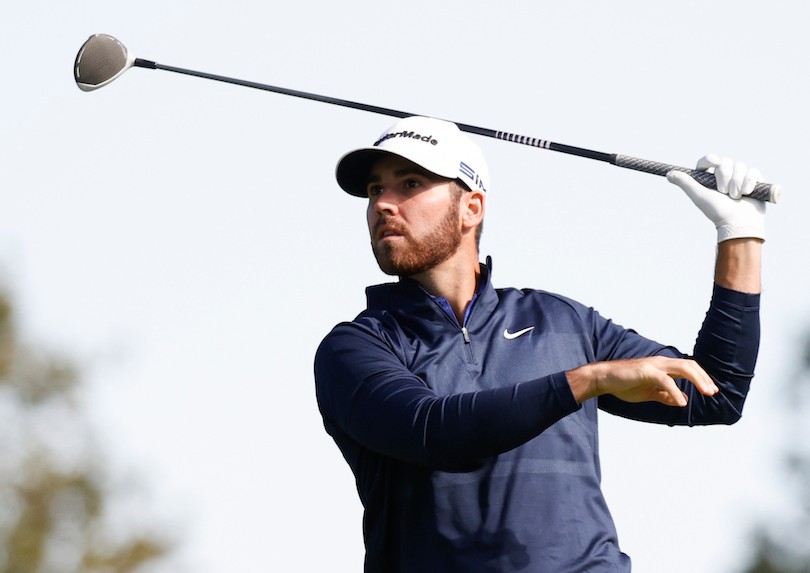
If it's any consolation for Matthew Wolff, he's not the first
The year: 2005. The site: Pinehurst No. 2, a veritable Donald Ross masterpiece hosting just its second U.S. Open. Defending champion Retief Goosen carries a three-stroke lead into the final round. Jason Gore, Olin Browne, Michael Campbell and Mark Hensby are the only guys within four of the unflappable South African, meaning this tournament had basically ended Saturday night.
Knock, knock. Who’s there? Freddy Krueger in plus-fours. Goosen wakes up on the wrong side of the bed and closes with an 81, three better than the aptly named Gore, with whom he was paired in the last grouping. Browne shoots a 79, and Campbell, who was infrequently seen before and never seen since, fends off Tiger Woods to find golf’s most toilsome title awaiting him in his locker.
Year: 2012. Site: San Francisco’s Olympic Club, where Arnold Palmer fumbled a seven-shot cushion with nine holes remaining almost a half-century earlier, then fell to Billy Casper in a Monday playoff. Jim Furyk, whose last big hook had occurred when he met his wife in 1995, snaps his tee ball into the trees at the par-5 16th. He adds another bogey at the 18th to play the final six holes in 3 over, and Webb Simpson becomes the third man in seven years to win a U.S. Open from the clubhouse.
Any attempt to forecast a major-championship outcome amounts to an inexact science conducted in a room full of wasted breath. We saw it yet again Sunday at Winged Foot. Even among those of us who flunked biology, never made it to chemistry and were flat-out frightened of physics, the unpredictable nature of the game’s biggest events is part of what makes them so memorable.
From Patrick Reed’s third-round meltdown to Rory McIlroy’s latest exercise in backpedaling, from a gentle golf course to a downright nasty one, Bryson DeChambeau’s dominant victory despite hitting 23 of 56 fairways officially turned conventional wisdom into a running joke. The bombers are here, and they’re not going anywhere but into the left trees to play their second shots.
Straight hitters and resourceful veterans don’t win U.S. Opens anymore because there aren’t many straight hitters and resourceful veterans left. Consider the prime leaderboard real estate occupied all weekend by Matthew Wolff, the 21-year-old Californian with a quick smile, funky technique and minimal knowledge of the game’s voluminous history.
Wolff made an excellent case for that ignorance-is-bliss deal throughout the final 36 holes, largely by shooting a ridiculous 65 after hitting just two fairways on Saturday. That killer round earned him a two-stroke lead over DeChambeau, at which point you didn’t need a golf historian to realize Sunday would be no sure thing.
And it wasn’t. Not even close. DeChambeau, the PGA Tour’s house iconoclast, assumed control of the tournament early and built a three-shot advantage midway into the back nine. Wolff didn’t play horribly in falling behind as much as Burly Bryson played extremely well, but it was a foreseeable falter from a kid who had spent the afternoon rolling around in a meadow of good fortune 24 hours earlier.
Perhaps Wolff’s lack of historical awareness had a lot to do with his career day. This was just a strapping lad destroying a diabolical ballpark from all the wrong positions, a dude without a care in the world and no short grass in sight. Nobody shoots a 65 at Winged Foot hitting 12 fairways, much less two, and once he’d completed his sloppy work of art, Wolff shrugged off the improbable accomplishment like a young man who didn’t know any better.
He even joked about his crooked driving to NBC’s Steve Sands in a post-round interview. Most tour pros would make a beeline to the practice range after such a performance, concerned a lot more about the two than they’d be pleased with the 65. Instead, Wolff was seen hanging out with a buddy or two and indulging in an ice cream sandwich.
Make no mistake: what Wolff did Saturday was amazing. It also was misleading, a scorecard mirage that might instill a false sense of competitive security in a guy with 30 career Tour starts, just one of them a major. There were four or five occasions when NBC cut from the early-Sunday action to Wolff on the range. We didn’t see him hit a shot. He was on his cellphone during each cutaway.
Imagine Tiger Woods chatting on his mobile device 45 minutes before teeing off in the final round of the U.S. Open with a two-stroke lead. It’s one thing to be loose and confident, but this was an exceptionally rare form of nonchalance from a talented guy who never had come close to embarking on such a pressure-packed experience. It was easy to question Wolff’s demeanor once he’d signed for a closing 75; DeChambeau was eight strokes better on Sunday and might have won by more than six if the third-round leader had showed up tight.
Wolff told NBC’s Sands that he’d learned a lot from losing to DeChambeau in Detroit 2½ months ago, but it wasn’t nearly enough.
Neither is 275 yards, center cut.
Sign up to receive the Morning Read newsletter, along with Where To Golf Next and The Equipment Insider.